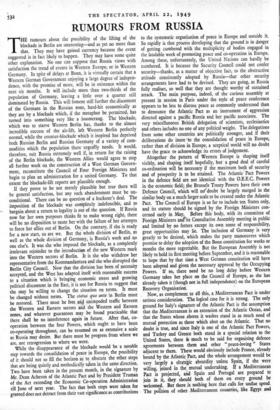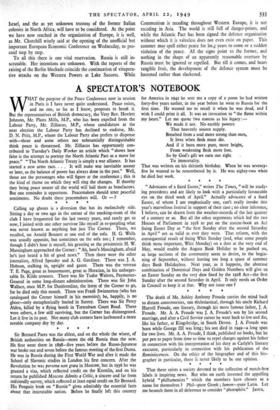RUMOURS FROM RUSSIA
THE rumours about the possibility of the lifting of the blockade in Berlin are interesting—and as yet no more than that. They may have gained currency because the event suggested is in fact likely to happen. They may have some quite other explanation. No one can suppose that Russia views with satisfaction the trend of events in Western Europe, or in Western Germany. In spite of delays at Bonn, it is virtually certain that a Western German Government enjoying a large degree of indepen- dence, with the promise of more, will be in existence within the next six months. It will include more than two-thirds of the population of Germany, leaving a little over a quarter still dominated by Russia. This will foment still further the discontent of the Germans in the Russian zone, hard-hit economically as they are by a blockade which, if the metaphor be permitted, has turned into something very like a boomerang. The blockade, Which was to starve Western Berlin has, thanks to the almost incredible success of the air-lift, left Western Berlin perfectly normal, while the counter-blockade which it inspired has deprived both Russian Berlin and Russian Germany of a variety of com- modities which the population there urgently needs. It would, therefore, suit Russia extremely well if, in return for the raising of the Berlin blockade, the Western Allies would agree to stop all further work on the construction of a West German Govern- ment, reconstitute the Council of Four Foreign Ministers and begin to plan an administration for a united Germany. To that extent the blockade-lift reports are plausible enough.
If they prove to be not merely plausible but true there will be general satisfaction, but any such abandonment must be un- conditional. There can be no question of a huckster's deal. The imposition of the blockade was completely indefensible, and to bargain about a return to legality is out of the question. If Russia now for her own purposes thinks fit to make wrong right, there will be no disposition to taunt her with the failure of her attempts to force her allies out of Berlin. On the contrary, if she is ready for a new start, so are we. But the whole division of Berlin, as well as the whole division of Germany, is Russia's work and no one else's. It was she who imposed the blockade, as a completely irrelevant rejoinder to the introduction of the new Western mark into the Western sectors of Berlin. It is she who withdrew her representative from the Kommandantura and she who disrupted the Berlin City Council. Now that the division has been of necessity accepted, and the West has adapted itself with reasonable success to a situation which is bringing economic stress and growing political discontent in the East, it is not for Russia to suggest that she may be willing to change the situation on terms. It must be changed without terms. The status quo ante in Berlin must be restored. There must be free and unimpeded traffic between the Western and Eastern sectors and the Western and Eastern zones, and whatever guarantees may be found practicable that there shall be no interference again in future. After that, co- operation between the four Powers, which ought to have been co-operating throughout, can be resumed on as extensive a scale as Russia may desire. But there must be progress from where we are, not retrogression to where we were.
While the disappearance of the blockade would be a notable step towards the consolidation of peace in Europe, the possibility of it should not so fill the horizon as to obscure the other steps that are being quietly and methodically taken in the same direction. Two have been taken in the present month, in the signature by Mr. Dean Acheson of the Atlantic Pact and by President Truman of the Act extending the Economic Co-operation Administration till June of next year. The fact that both steps were taken for granted does not detract from their vast significance as contributions to the systematic organisation of peace in Europe and outside it. So rapidly is that process developing that the ground is in danger of getting cumbered with the multiplicity of bodies engaged in the laudable work of promoting peace and co-operation in Europe. Among these, unfortunately, the United Nations can hardly be numbered. It is because the Security Council could not confer security—thanks, as a matter of objective fact, to the obstructive attitude consistently adopted by Russia—that other security arrangements have had to be devised. They are going, as Russia fully realises, so well that they are thought worthy of sustained attack. The main purpose, indeed, of the curious assembly at present in session in Paris under the style of peace conference appears to be less to discuss peace as commonly understood than to denounce the Atlantic Pact as an instrument of aggression directed against a pacific Russia and her pacific associates. The very miscellaneous British delegation of scientists, ecclesiastics and others includes no one of any political weight. The delegations from some other countries are politically stronger, and if their deliberations do inure ' to the consolidation of peace in Europe, rather than of division in Europe, a sceptical world will no doubt have the grace to acknowledge its errors of judgement.
Altogether the pattern of Western Europe is shaping itself visibly, and shaping itself hopefully, but a good deal of careful co-ordination will be necessary if the maximum both of security and of prosperity is to be attained. The Atlantic Pact Powers in the defence field are not identical with the O.E.E.C.. Powers in the economic field; the Brussels Treaty Powers have their own Defence Council, which will no` doubt be largely merged in the similar body on a much larger scale to be created under the Atlantic Pact. The Council of Europe is so far to include ten States only, and its statute should be signed by the Foreign Ministers con- cerned early in May. Before this body, with its committee of Foreign Ministers anctts Consultative Assembly meeting in public and limited by no fetters except its own sense of responsibility, great opportunities may lie. The inclusion of Germany is very greatly to be desired, which makes the party manoeuvres which promise to delay the adoption of the Bonn constitution for weeks or months the more regrettable. But the European Assembly is not likely to hold its first meeting before September, and it is reasonable to hope that by that time a West German constitution will have been adopted and given the necessary approval by the Occupying Powers. If so, there need be no long delay before Western Germany takes her place on the Council of Europe, as she has already taken it (though not in full independence) on the European Recovery Organisation.
Now, as complement to all this, a Mediterranean Pact is under serious consideration. The logical case for it is strong. The only ground for Italy's signature of the Atlantic Pact is the assumption that the Mediterranean is an extension of the Atlantic Ocean, and that the States whose shores it washes stand in as much need of mutual protection as those which abut on the Atlantic. That no doubt is true, and since Italy is one of the Atlantic Pact Powers, and Turkey and Greece both stand in a special relation to the United States, there, much to be said for organising defence agreements between them and other " peace-loving " States adjacent to them. These would obviously include France, already bound by the Atlantic Pact, and the whole arrangement would be very largely a strategic absurdity unless Spain, if she were willing, joined in the mutual undertaking. If a Mediterranean Pact is projected, and Spain and Portugal are prepared to join in it, they should both of them on every ground be welcomed. But there is nothing here that calls for undue speed. The position of other Mediterranean countries, like Egypt and



































 Previous page
Previous page